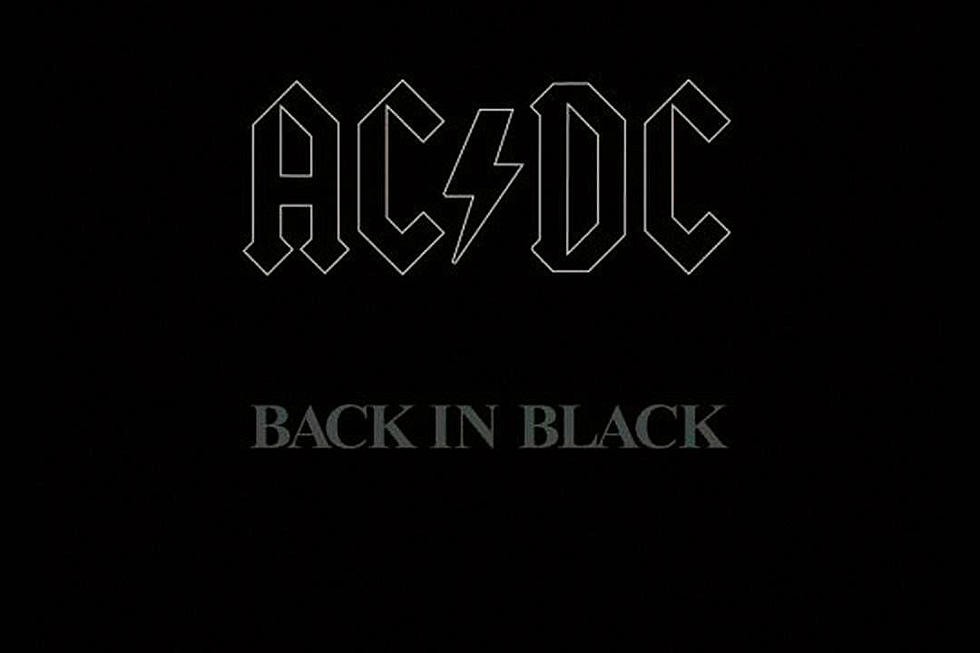
How AC/DC Rebounded From Bon Scott’s Death With ‘Back in Black’
AC/DC worked for years to pave the way for their breakthrough to worldwide stardom. Yet when it finally arrived with 1979's Highway to Hell album, they had to start over after the devastating death of singer Bon Scott.
For guitarist Angus Young, who formed the creative core of the band with his brother Malcolm, Scott's sudden passing was "like losing a member of your family. It’s very, very difficult to go through something like that," he later admitted. "Not only is it your friend, it’s also somebody you’ve been working with all that time."
He and Malcolm were particularly shaken because Scott's wild lifestyle never seemed to have an impact on him: "He would drink like a fish, and when you saw him the next morning, he’d be no worse for wear," Angus told Guitar World. "And you’d think to yourself, ‘How does this guy do this?'"
Even as they reeled from Scott's death, the Young brothers were quick to soldier on. "Malcolm called me and said, 'Me and you will keep working on the songs that we had been writing,'" Angus said. "'It'll take our minds off all of this.'"
Working on new material in the days after Scott's passing wasn't easy, and replacing him was an even more daunting task, yet somehow, the Youngs managed to do both: AC/DC started rehearsing on March 1, 1980, two days after Scott's funeral, and quickly started the arduous process of auditioning new singers. By early April, they knew they'd found their man: Brian Johnson, former frontman for a British band named Geordie that, as fate would have it, Scott had seen perform.
As Angus Young later reflected, Scott's surviving bandmates didn't take his seal of approval lightly, and had high expectations for Johnson. "We knew if Bon liked him, he must be good," Young recalled. "Bon didn’t like many people."
With Highway to Hell producer Robert John "Mutt" Lange in tow, the newly revamped AC/DC decamped to Compass Point Studios in the Bahamas, where they set about tracking the new songs while their new singer assumed the responsibility of not only following Scott as a vocalist, but taking over for him as a lyricist — and doing it at a fairly furious clip, too. Faster than anyone could have expected, the band started building what would become their seventh studio LP, Back in Black.
"It was a strange situation where the guys came in and just said 'Hey Brian, this is what we recorded in the studio today. Have a listen to it and put some words on it, just write some words.' And I’m going, “Oh, my God,'" Johnson told UCR's Matt Wardlaw. "And I had to do it for the next day, because we didn’t have much time, because the next day, they would bring another one in! So I couldn’t really just say 'Oh well, it may take me a couple of days.' And then the next day, another one came in and they just kept coming in.
"So to come up with choruses and words and verses and melodies, it was quite a challenge, you know?" Johnson added. "Because it was my first time with a band. I’d never been with the boys before. They must have trusted me, to just say that '[Writing], that’s your department. Come up with the tunes and lyrics for this!' But it worked, you know? Sometimes, when you’re under pressure, you really just buckle down to it, you know?"
Johnson was under pressure, but he also had plenty of support. "Hitting some of those notes was a real challenge," engineer Tony Platt told Sound on Sound. "There was a massive amount of pressure on Brian’s shoulders, but everyone was very sympathetic and supportive of him. We were all completely in awe of what he was doing and there were lots of positive vibes. So, whenever he had a moment of ‘I’m not sure I can do this,’ there were plenty of people around to tell him quite clearly that he could."
Watch AC/DC Perform 'You Shook Me All Night Long'
Back in Black wrapped in May, and made its way through the label in the record industry equivalent of the blink of an eye, arriving in stores on July 25, 1980. Just about the only hiccup seems to have been a slight disagreement over the album artwork, which was presented as a simple black cover — a sign of mourning for Scott — which the label balked at until the band agreed to add outlines of its logo and the album title. Simple, yet powerfully effective — just like AC/DC's best songs.
As it happened, Back in Black was packed full of some of the strongest material the band had delivered to date — something fans rewarded them for in droves. The record soared to No. 4 on the U.S. charts and No. 1 in the U.K., and gave AC/DC a pair of American Top 40 hits with "You Shook Me All Night Long" (No. 35) and the title track (No. 37). Those rare pop crossovers were just two of the more memorable cuts on an LP that would become a virtual standard bearer for blue-collar hard rock in general, and eventually took a spot among the Top 10 bestselling albums of all time.
Johnson immediately cemented his spot in AC/DC with Back in Black, but he couldn't avoid comparisons to his predecessor or a fan debate over who was the "better" singer. As Angus later told UCR, the band knew it would face some resistance when it decided to forge ahead: "We really didn’t know if the people who knew AC/DC accept this. Would they accept Brian? It was a lot of pressure on him. But I think we all wanted to make it happen."
"You know the first thing Angus and Malcolm said to me when I joined this band? They said, 'Do you mind if your feelings ever get hurt?' And I said, 'Why?' And they said, 'Because if you're going to join this band, you're going to be expected to take fucking stick. Because we've been slagged off by every fucking reporter since we left Australia,'" Johnson told Creem in 1982.
"And I said, 'Well, I'm going to have to take stick anyway, taking this lad's place,'" Johnson added. "But luckily, these guys are so much like a fucking family that you never get the chance to feel alone, like you could just sit by yourself in your hotel room and feel like shit. The lads say to me, 'Just fucking ignore them' when they say, 'He sounds like a Xerox of his predecessor.'"
Even as a member of AC/DC, Johnson remained a fan. "This band's the fucking best! The biggest bonus about being in this band is the fact that I can get into their gigs without paying for a fucking ticket, and I've got the best seat in the fucking house," he enthused. "Honest! I could just sit up there and watch them. And now and again I've forgotten I'm singing and I just stop and watch that band, because I think they're just fucking great. A great band and a great bunch of lads."
Several decades and a slew of bestselling albums later, AC/DC continued taking stick from critics who carped about the band's refusal to evolve beyond its signature brand of simple, hard-hitting rock 'n' roll. Johnson summed up his feelings on the matter in the same conversation with Creem: "I couldn't believe it, that album," he marveled regarding Back in Black's massive success. "I thought, 'Fucking hell, what have I done?' Whatever I did, I'm going to keep on doing it. I'm not going to bother changing for anyone."
AC/DC Albums Ranked
You Think You Know AC/DC?
More From Ultimate Classic Rock









